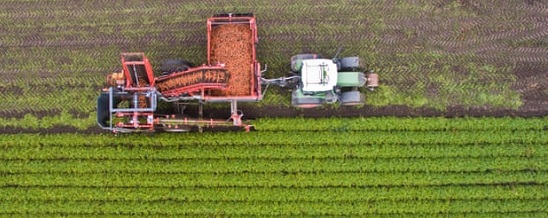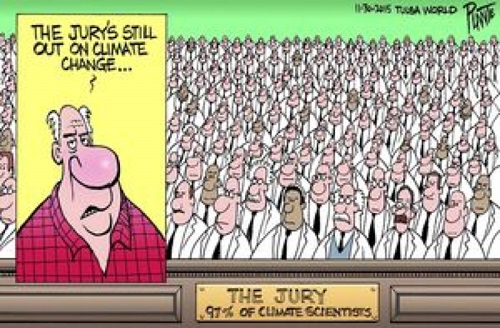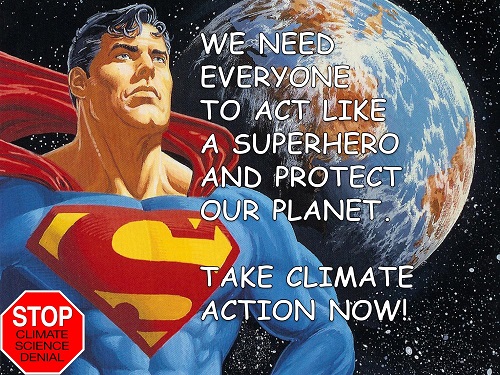2019 SkS Weekly Climate Change & Global Warming Digest #8
Posted on 24 February 2019 by John Hartz
Story of the Week... Opinion of the Week... Toon of the Week... Quote of the Week... Coming Soon on SkS... Poster of the Week... SkS Week in Review...
Story of the Week...
World's food supply under 'severe threat' from loss of biodiversity
Plants, insects and organisms crucial to food production in steep decline, says UN

Organic carrot harvest in Germany. Organic agriculture makes up just 1% of global farmland. Photograph: Julian Stratenschulte/EPA
The world’s capacity to produce food is being undermined by humanity’s failure to protect biodiversity, according to the first UN study of the plants, animals and micro-organisms that help to put meals on our plates.
The stark warning was issued by the Food and Agriculture Organisation after scientists found evidence the natural support systems that underpin the human diet are deteriorating around the world as farms, cities and factories gobble up land and pump out chemicals.Over the last two decades, approximately 20% of the earth’s vegetated surface has become less productive, said the report, launched on Friday.
It noted a “debilitating” loss of soil biodiversity, forests, grasslands, coral reefs, mangroves, seagrass beds and genetic diversity in crop and livestock species. In the oceans, a third of fishing areas are being overharvested.
Many species that are indirectly involved in food production, such as birds that eat crop pests and mangrove trees that help to purify water, are less abundant than in the past, noted the study, which collated global data, academic papers and reports by the governments of 91 countries.
It found 63% of plants, 11% of birds, and 5% of fish and fungi were in decline. Pollinators, which provide essential services to three-quarters of the world’s crops, are under threat. As well as the well-documented decline of bees and other insects, the report noted that 17% of vertebrate pollinators, such as bats and birds, were threatened with extinction.
Once lost, the species that are critical to our food systems cannot be recovered, it said. “This places the future of our food and the environment under severe threat.”
World's food supply under 'severe threat' from loss of biodiversity by Jonathan Watts, Guardian, Feb 21, 2019
Opinion of the Week...
The Hard Lessons of Dianne Feinstein’s Encounter with the Young Green New Deal Activists
In an exchange that went viral, the senator from California demonstrated why climate change exemplifies an issue on which older people should listen to the young.
Photograph by Mark Peterson / Redux/h5>
One imagines that Senator Dianne Feinstein would like a do-over of her colloquy with some young people on Friday afternoon. A group of school students, at least one as young as seven, went to the senator’s San Francisco office to ask her to support the Green New Deal climate legislation. In a video posted online by the Sunrise Movement, she tells them that the resolution isn’t a good one, because it can’t be paid for, and the Republicans in the Senate won’t support it. She adds that she is at work on her own resolution, which she thinks could pass. Then, when the group persists in supporting the Green New Deal, which was introduced by Representative Alexandria Ocasio-Cortez, Feinstein responds, “You know what’s interesting about this group? I’ve been doing this for thirty years. I know what I’m doing. You come in here and you say, ‘It has to be my way or the highway.’ I don’t respond to that. I’ve gotten elected, I just ran, I was elected by almost a million-vote plurality,” she continued. “And I know what I’m doing. So, you know, maybe people should listen a little bit.”
The Hard Lessons of Dianne Feinstein’s Encounter with the Young Green New Deal Activists, Opinion by Bill McKibben, New Yorker Magazine, Feb 23, 2019
Toon of the Week...

Coming Soon on SkS...
- Fighting Climate Change: Structural vs individual action (Climate Adam)
- Prices are not enough (Frank Ackerman)
- Analysis: The climate papers most featured in the media in 2018 (Robert McSweeney)
- Next self-paced run of Denial101x starts on March 5 (Baerbel)
- New research this week (Ari)
- 2019 SkS Weekly Climate Change & Global Warming News Roundup #9 (John Hartz)
- 2019 SkS Weekly Climate Change & Global Warming Digest #9 (John Hartz)
Poster of the Week...

SkS Week in Review...
- 2019 SkS Weekly Climate Change & Global Warming News Roundup #8 by John Hartz
- New research, February 11-17, 2019 by Ari Jokimäki
- Global coal use may have peaked in 2014, says latest IEA World Energy Outlook by Simon Evans (Carbon Brief)
- Studies shed new light on Antarctica’s future contribution to sea level rise by Robert McSweeney (Carbon Brief)
- A Swedish Teenager's Compelling Plea on Climate by Greenman 3610 (Yale Climate Connections)
- 2019 SkS Weekly Climate Change & Global Warming Digest #7 by John Hartz































 Arguments
Arguments































Organic farming, if only practiced to satisfy the 'letter of the law' is not the answer. Read Growing a Revolution by Montgomery and/or The Third Plate by Barber for a better way, which is actually what we would all think of when we hear the term Organic Farming.
I read an article called regenerative agriculture on wikipedia last year. Quite an eye opener. One system, many benefits.
I read the nearly 200 myths first to see if the subject was addressed, but I didn't see it. On several discussion boards I've seen people, usually conservatives, respond to global warming with nuclear power nuclear power nuclear power. I have a physics background, so I was able to spend 30 minutes putting together a quick explanation of why nuclear power is not a solution to global warming, because of the lead time for building new plants, the number of new plants that would be needed, the problems with waste, the expense of decommissioning, etc etc. But I was wondering if anybody knew of a comprehensive explanation that addresses all the considerations about why nuclear power is an inadequate response to global warming, so I could just link to that instead of having to reargue it each time.
Steve
[PS] Some nuclear power proponents coming here have been asked to write up an article (which would need to be reviewed) putting the case, and backed by peer-reviewed literature. So far havent had any takers. Abbot 2011 does not seem to have an adequate reply from the nuclear industry but maybe there is one now. Does it fit your requirements? The main problem nuclear power has is convincing investors that it is a good deal.
That Abbott article is very close to exactly what I was looking for. Thanks.
Facts will struggle to persuade conservatives. They like nuclear power because liberals dont like nuclear power. Its become politically tribal. But good luck, facts are probably still worth a try.
stevestory @3,
Over a decade ago I was tasked with presenting an opinion for a green group on nuclear power. A bit of a poisoned chalice, I knew it would make some unhappy which ever side of the argument I came down on. Safety, weaponisation, cost, the absence of new-build plants (or plans for them), inflexibility of output - all could be argued both ways.
Happily, there was one area where there was no ambiguity - nuclear failed. The present technology on offer hardily had enough uranium to fuel itself at present-day levels (2% of world power) for a century. If nuclear use was scaled up to levels useful within global AGW mitigation policies, it would very quickly run out of fuel to power itself.
This fuel difficulty facing nuclear power is not widely cited as being a problem. Sources of uranium that would overcome the problem are all problems themselves (like fuel reprocessing or sourcing uranium from sea water, etc). We are thus left with conventional known uranium reserves that would last several decades at present useage.
It was a few years ago that I did this analysis. I note today that more uranium reserves have been identified since then. See here. Still producing 2% or less of global primary energy consumption, nuclear has a little over 100 years-worth of uranium reserves if uranium prices double. (Fuel cost is not a massive issue in the nuclear industry.)